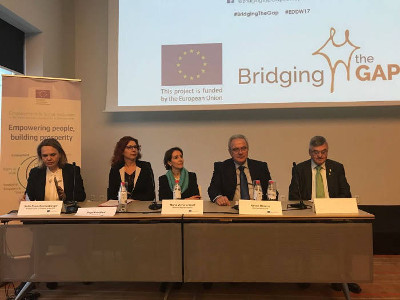
05/12/2017
The Project promotes socio-economic inclusion, equality and non-discrimination in medium and low income countries
Bridging the Gap is the new European Union mobility project, aimed at contributing to socio-economic inclusion, equality and non-discrimination for people with disabilities in medium and low income countries in Africa and Latin America. It operates in five countries (Ecuador, Burkina Faso, Sudan, Ethiopia and Paraguay) to strengthen institutions and develop responsible, inclusive policies.
The International Cooperation and Development commissioner, Neven Mimica, opened the meeting by highlighting its “decisive socio-economic impact, in line with national policies and global commitments”.
Bridging the Gap works on two levels. Firstly, it seeks to implement the 2030 Agenda for Sustainable Development, which explicitly calls for the inclusion of people with disabilities in all aspects of society, “leaving no one behind”, in order to produce guidelines, tools and materials for action in the different countries.
And secondly, it has set up action lines for specific sectors in each country depending on its needs: inclusive education in Ecuador, universal access to healthcare in Burkina Faso, employment in Sudan, social protection in Ethiopia and improving data collection and systematisation in Paraguay, “focusing on the empowerment of women in all these activities”.
The presentation formed part of European Disability and Development Week (EDDW), which is “dedicated to the billion people around the world who live with disabilities”, as the Commissioner said.
Mimica ended by noting that “a society that promotes and protects human rights and the diversity of every one of us is stronger, more stable and offers success to all”.

Over the last four years, the European Commission has entrusted FIIAPP with managing this project, which receives almost €7 million in funding. Three cooperation agencies will work together on the project: the Spanish International Cooperation Agency for Development (AECID), the Italian Agency for Development Cooperation (IADC), and the Austrian Development Agency (ADA), plus two international disability agencies: the European Disability Forum (EDF) and the International Disability and Development Consortium (IDDC), along with the European Commission Directorate General for International Cooperation and Development (DG DEVCO), the Finnish Ministry of External Affairs and the United Nation’s High Commission for Human Rights as observers.